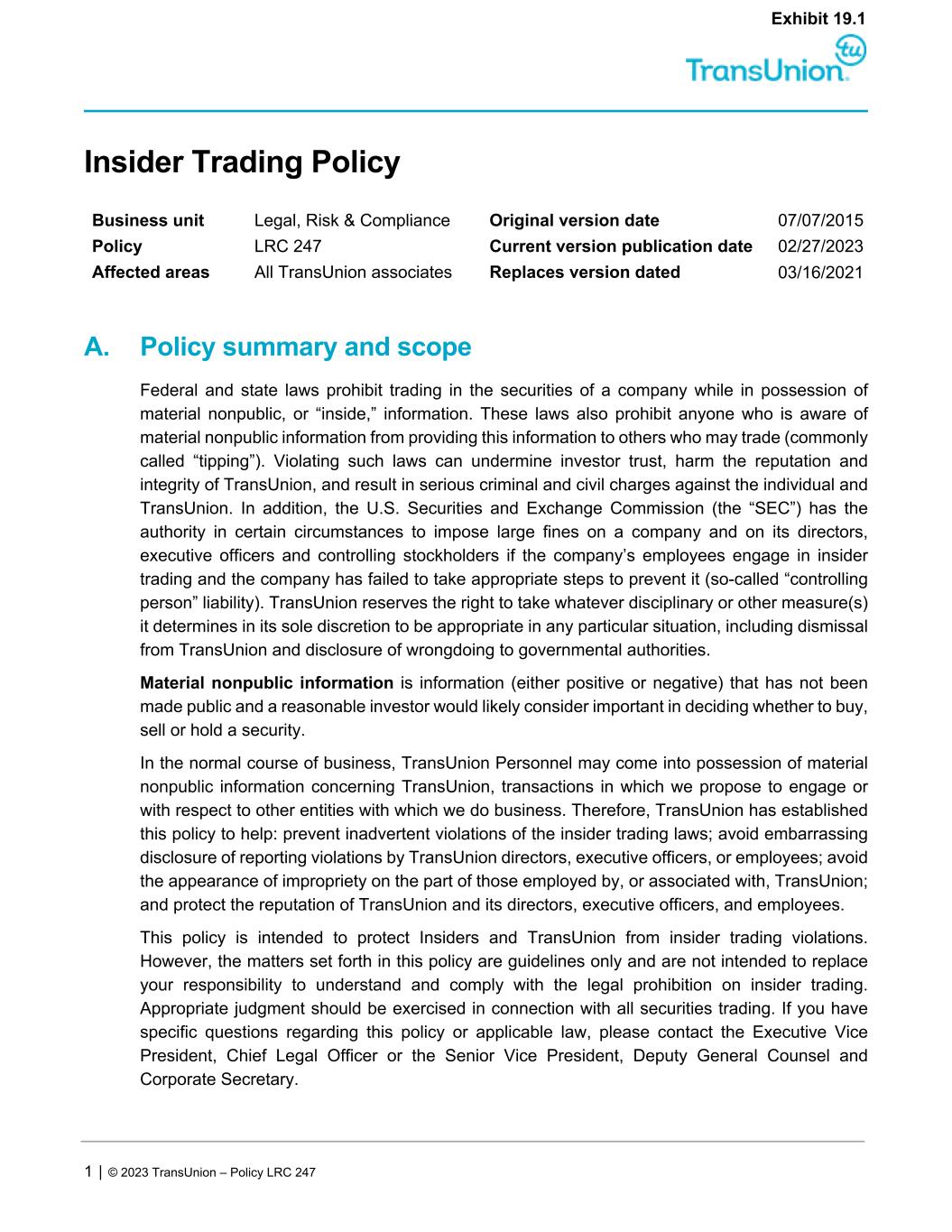
1 | © 2023 TransUnion – Policy LRC 247 Insider Trading Policy Business unit Legal, Risk & Compliance Original version date 07/07/2015 Policy LRC 247 Current version publication date 02/27/2023 Affected areas All TransUnion associates Replaces version dated 03/16/2021 A. Policy summary and scope Federal and state laws prohibit trading in the securities of a company while in possession of material nonpublic, or “inside,” information. These laws also prohibit anyone who is aware of material nonpublic information from providing this information to others who may trade (commonly called “tipping”). Violating such laws can undermine investor trust, harm the reputation and integrity of TransUnion, and result in serious criminal and civil charges against the individual and TransUnion. In addition, the U.S. Securities and Exchange Commission (the “SEC”) has the authority in certain circumstances to impose large fines on a company and on its directors, executive officers and controlling stockholders if the company’s employees engage in insider trading and the company has failed to take appropriate steps to prevent it (so-called “controlling person” liability). TransUnion reserves the right to take whatever disciplinary or other measure(s) it determines in its sole discretion to be appropriate in any particular situation, including dismissal from TransUnion and disclosure of wrongdoing to governmental authorities. Material nonpublic information is information (either positive or negative) that has not been made public and a reasonable investor would likely consider important in deciding whether to buy, sell or hold a security. In the normal course of business, TransUnion Personnel may come into possession of material nonpublic information concerning TransUnion, transactions in which we propose to engage or with respect to other entities with which we do business. Therefore, TransUnion has established this policy to help: prevent inadvertent violations of the insider trading laws; avoid embarrassing disclosure of reporting violations by TransUnion directors, executive officers, or employees; avoid the appearance of impropriety on the part of those employed by, or associated with, TransUnion; and protect the reputation of TransUnion and its directors, executive officers, and employees. This policy is intended to protect Insiders and TransUnion from insider trading violations. However, the matters set forth in this policy are guidelines only and are not intended to replace your responsibility to understand and comply with the legal prohibition on insider trading. Appropriate judgment should be exercised in connection with all securities trading. If you have specific questions regarding this policy or applicable law, please contact the Executive Vice President, Chief Legal Officer or the Senior Vice President, Deputy General Counsel and Corporate Secretary. Exhibit 19.1

INSIDER TRADING POLICY 2 | © 2023 TransUnion – Policy LRC 247 This policy applies to all officers, directors and employees of TransUnion or any of its subsidiaries (collectively, “TransUnion Personnel”). For purposes of this policy, “officers” refer to those individuals who meet the definition of “officer” under Section 16 of the Securities Exchange Act of 1934 (as amended, the “Exchange Act”). Individuals subject to this policy are responsible for ensuring that members of their household comply with this policy. This policy also applies to any entities controlled by individuals subject to the policy, including any corporations, limited liability companies, partnerships or trusts, and transactions by these entities should be treated for the purposes of this policy as if they were for the individual’s own account. TransUnion may determine that this policy applies to additional persons with access to material nonpublic information, such as contractors or consultants. Officers, directors and employees, together with any other person designated as being subject to this policy by the Chief Legal Officer or Chief Financial Officer (or their respective designees), are referred to collectively as “Insiders.” B. Prohibitions Relating to Transactions in the Company’s Securities This section applies to: All Insiders (other than unrelated persons whom the Chief Legal Officer of TransUnion determines should not be covered by this policy). 1. Prohibited Activities Except as provided in Section D, no person or entity covered by this Section B may: purchase or sell any securities of TransUnion while he or she is in possession of any material nonpublic information concerning TransUnion, or recommend to another person that they do so; disclose to (i.e., tip) any other person any material nonpublic information concerning TransUnion (see also Communications Policy | Public Communications and Compliance with Regulation FD) purchase or sell any securities of any other company while he or she is in possession of any material nonpublic information concerning such other company, including, without limitation, any customer, supplier, competitor or potential acquisition target, or recommend to another person that they do so; or disclose to (i.e., tip) any other person any material nonpublic information concerning another company, which he or she learned in the course of his or her service to or relationship with TransUnion, such as by purchasing or selling securities of such other company or sharing that information with others. 2. Public Communications No covered person who receives or has access to TransUnion’s material nonpublic information may comment on stock price movements or rumors of other corporate
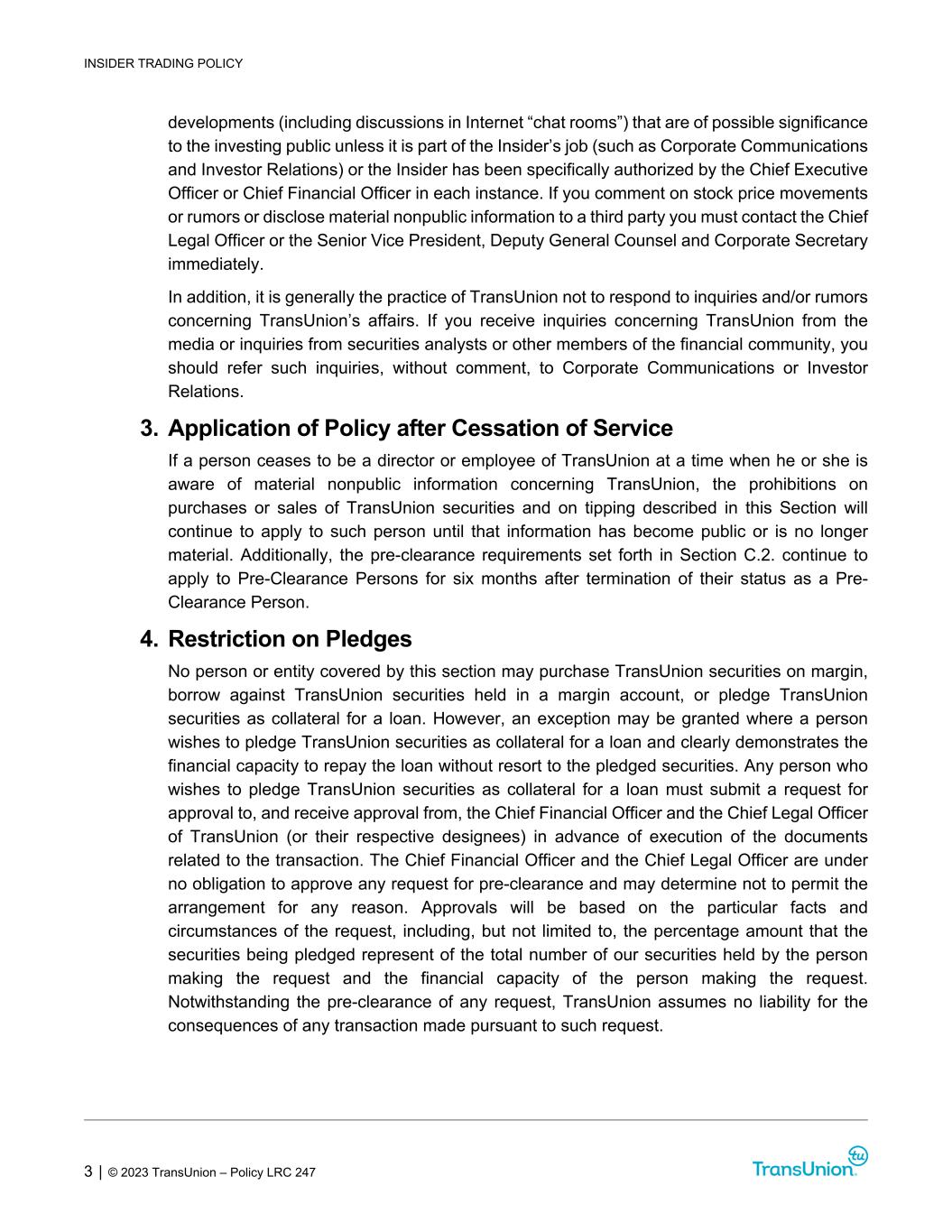
INSIDER TRADING POLICY 3 | © 2023 TransUnion – Policy LRC 247 developments (including discussions in Internet “chat rooms”) that are of possible significance to the investing public unless it is part of the Insider’s job (such as Corporate Communications and Investor Relations) or the Insider has been specifically authorized by the Chief Executive Officer or Chief Financial Officer in each instance. If you comment on stock price movements or rumors or disclose material nonpublic information to a third party you must contact the Chief Legal Officer or the Senior Vice President, Deputy General Counsel and Corporate Secretary immediately. In addition, it is generally the practice of TransUnion not to respond to inquiries and/or rumors concerning TransUnion’s affairs. If you receive inquiries concerning TransUnion from the media or inquiries from securities analysts or other members of the financial community, you should refer such inquiries, without comment, to Corporate Communications or Investor Relations. 3. Application of Policy after Cessation of Service If a person ceases to be a director or employee of TransUnion at a time when he or she is aware of material nonpublic information concerning TransUnion, the prohibitions on purchases or sales of TransUnion securities and on tipping described in this Section will continue to apply to such person until that information has become public or is no longer material. Additionally, the pre-clearance requirements set forth in Section C.2. continue to apply to Pre-Clearance Persons for six months after termination of their status as a Pre- Clearance Person. 4. Restriction on Pledges No person or entity covered by this section may purchase TransUnion securities on margin, borrow against TransUnion securities held in a margin account, or pledge TransUnion securities as collateral for a loan. However, an exception may be granted where a person wishes to pledge TransUnion securities as collateral for a loan and clearly demonstrates the financial capacity to repay the loan without resort to the pledged securities. Any person who wishes to pledge TransUnion securities as collateral for a loan must submit a request for approval to, and receive approval from, the Chief Financial Officer and the Chief Legal Officer of TransUnion (or their respective designees) in advance of execution of the documents related to the transaction. The Chief Financial Officer and the Chief Legal Officer are under no obligation to approve any request for pre-clearance and may determine not to permit the arrangement for any reason. Approvals will be based on the particular facts and circumstances of the request, including, but not limited to, the percentage amount that the securities being pledged represent of the total number of our securities held by the person making the request and the financial capacity of the person making the request. Notwithstanding the pre-clearance of any request, TransUnion assumes no liability for the consequences of any transaction made pursuant to such request.
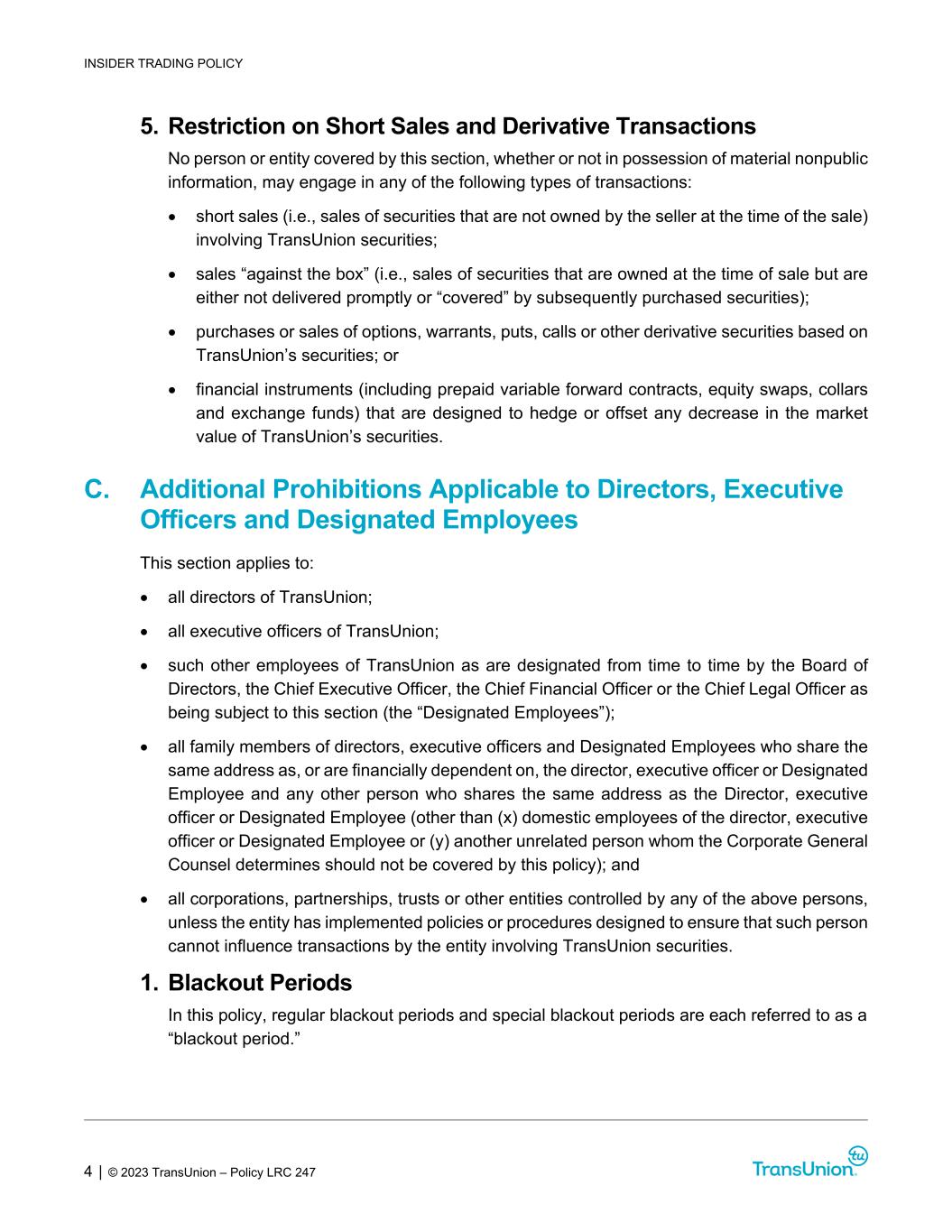
INSIDER TRADING POLICY 4 | © 2023 TransUnion – Policy LRC 247 5. Restriction on Short Sales and Derivative Transactions No person or entity covered by this section, whether or not in possession of material nonpublic information, may engage in any of the following types of transactions: short sales (i.e., sales of securities that are not owned by the seller at the time of the sale) involving TransUnion securities; sales “against the box” (i.e., sales of securities that are owned at the time of sale but are either not delivered promptly or “covered” by subsequently purchased securities); purchases or sales of options, warrants, puts, calls or other derivative securities based on TransUnion’s securities; or financial instruments (including prepaid variable forward contracts, equity swaps, collars and exchange funds) that are designed to hedge or offset any decrease in the market value of TransUnion’s securities. C. Additional Prohibitions Applicable to Directors, Executive Officers and Designated Employees This section applies to: all directors of TransUnion; all executive officers of TransUnion; such other employees of TransUnion as are designated from time to time by the Board of Directors, the Chief Executive Officer, the Chief Financial Officer or the Chief Legal Officer as being subject to this section (the “Designated Employees”); all family members of directors, executive officers and Designated Employees who share the same address as, or are financially dependent on, the director, executive officer or Designated Employee and any other person who shares the same address as the Director, executive officer or Designated Employee (other than (x) domestic employees of the director, executive officer or Designated Employee or (y) another unrelated person whom the Corporate General Counsel determines should not be covered by this policy); and all corporations, partnerships, trusts or other entities controlled by any of the above persons, unless the entity has implemented policies or procedures designed to ensure that such person cannot influence transactions by the entity involving TransUnion securities. 1. Blackout Periods In this policy, regular blackout periods and special blackout periods are each referred to as a “blackout period.”
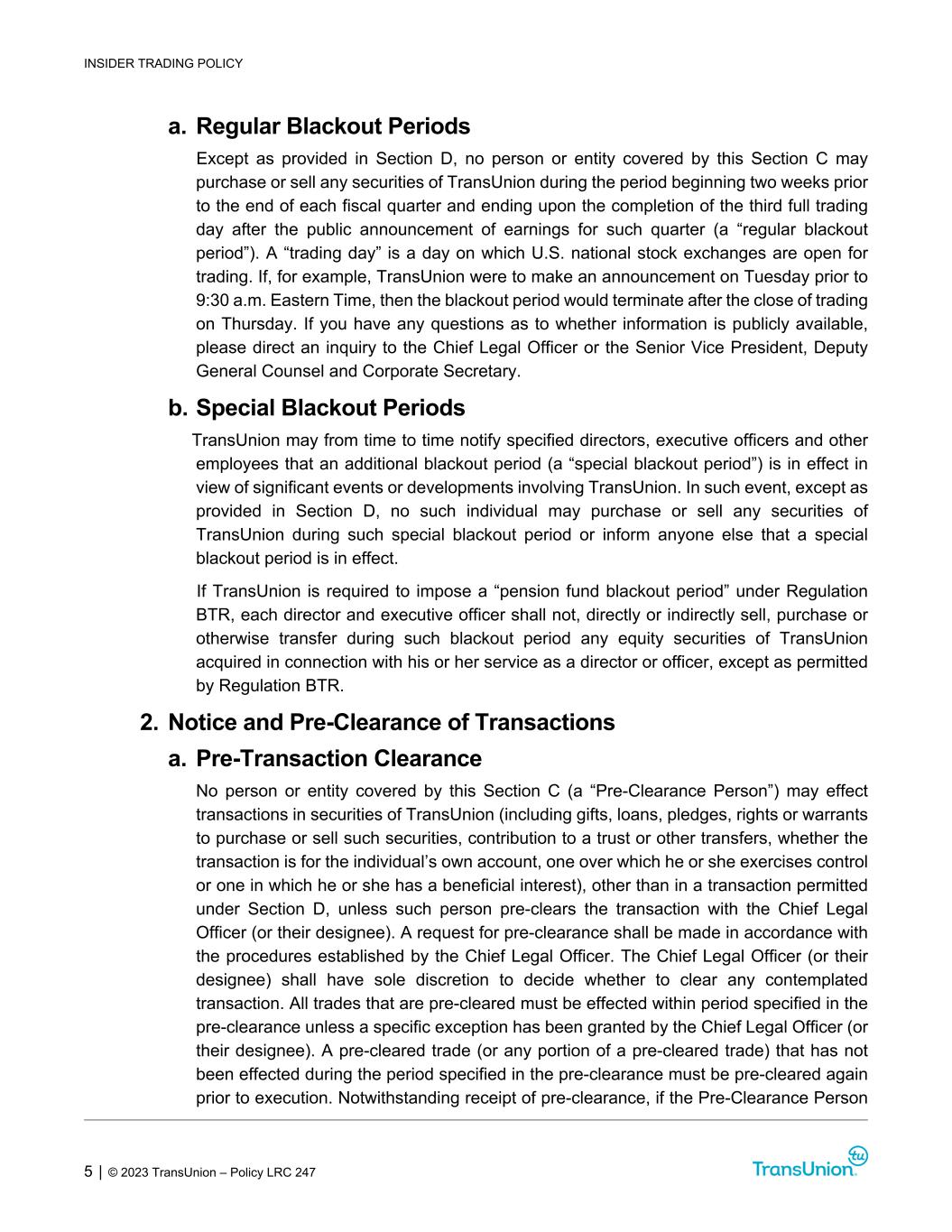
INSIDER TRADING POLICY 5 | © 2023 TransUnion – Policy LRC 247 a. Regular Blackout Periods Except as provided in Section D, no person or entity covered by this Section C may purchase or sell any securities of TransUnion during the period beginning two weeks prior to the end of each fiscal quarter and ending upon the completion of the third full trading day after the public announcement of earnings for such quarter (a “regular blackout period”). A “trading day” is a day on which U.S. national stock exchanges are open for trading. If, for example, TransUnion were to make an announcement on Tuesday prior to 9:30 a.m. Eastern Time, then the blackout period would terminate after the close of trading on Thursday. If you have any questions as to whether information is publicly available, please direct an inquiry to the Chief Legal Officer or the Senior Vice President, Deputy General Counsel and Corporate Secretary. b. Special Blackout Periods TransUnion may from time to time notify specified directors, executive officers and other employees that an additional blackout period (a “special blackout period”) is in effect in view of significant events or developments involving TransUnion. In such event, except as provided in Section D, no such individual may purchase or sell any securities of TransUnion during such special blackout period or inform anyone else that a special blackout period is in effect. If TransUnion is required to impose a “pension fund blackout period” under Regulation BTR, each director and executive officer shall not, directly or indirectly sell, purchase or otherwise transfer during such blackout period any equity securities of TransUnion acquired in connection with his or her service as a director or officer, except as permitted by Regulation BTR. 2. Notice and Pre-Clearance of Transactions a. Pre-Transaction Clearance No person or entity covered by this Section C (a “Pre-Clearance Person”) may effect transactions in securities of TransUnion (including gifts, loans, pledges, rights or warrants to purchase or sell such securities, contribution to a trust or other transfers, whether the transaction is for the individual’s own account, one over which he or she exercises control or one in which he or she has a beneficial interest), other than in a transaction permitted under Section D, unless such person pre-clears the transaction with the Chief Legal Officer (or their designee). A request for pre-clearance shall be made in accordance with the procedures established by the Chief Legal Officer. The Chief Legal Officer (or their designee) shall have sole discretion to decide whether to clear any contemplated transaction. All trades that are pre-cleared must be effected within period specified in the pre-clearance unless a specific exception has been granted by the Chief Legal Officer (or their designee). A pre-cleared trade (or any portion of a pre-cleared trade) that has not been effected during the period specified in the pre-clearance must be pre-cleared again prior to execution. Notwithstanding receipt of pre-clearance, if the Pre-Clearance Person
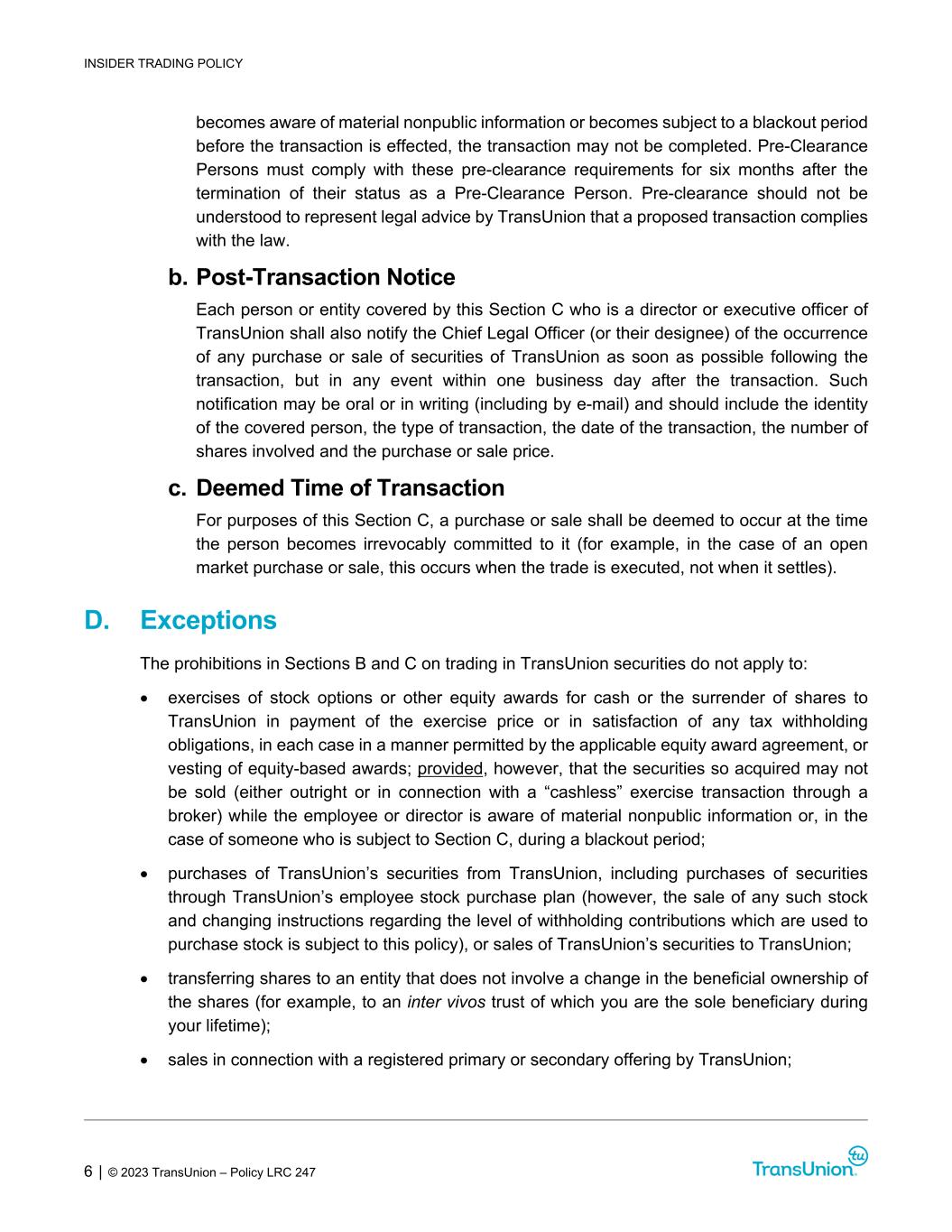
INSIDER TRADING POLICY 6 | © 2023 TransUnion – Policy LRC 247 becomes aware of material nonpublic information or becomes subject to a blackout period before the transaction is effected, the transaction may not be completed. Pre-Clearance Persons must comply with these pre-clearance requirements for six months after the termination of their status as a Pre-Clearance Person. Pre-clearance should not be understood to represent legal advice by TransUnion that a proposed transaction complies with the law. b. Post-Transaction Notice Each person or entity covered by this Section C who is a director or executive officer of TransUnion shall also notify the Chief Legal Officer (or their designee) of the occurrence of any purchase or sale of securities of TransUnion as soon as possible following the transaction, but in any event within one business day after the transaction. Such notification may be oral or in writing (including by e-mail) and should include the identity of the covered person, the type of transaction, the date of the transaction, the number of shares involved and the purchase or sale price. c. Deemed Time of Transaction For purposes of this Section C, a purchase or sale shall be deemed to occur at the time the person becomes irrevocably committed to it (for example, in the case of an open market purchase or sale, this occurs when the trade is executed, not when it settles). D. Exceptions The prohibitions in Sections B and C on trading in TransUnion securities do not apply to: exercises of stock options or other equity awards for cash or the surrender of shares to TransUnion in payment of the exercise price or in satisfaction of any tax withholding obligations, in each case in a manner permitted by the applicable equity award agreement, or vesting of equity-based awards; provided, however, that the securities so acquired may not be sold (either outright or in connection with a “cashless” exercise transaction through a broker) while the employee or director is aware of material nonpublic information or, in the case of someone who is subject to Section C, during a blackout period; purchases of TransUnion’s securities from TransUnion, including purchases of securities through TransUnion’s employee stock purchase plan (however, the sale of any such stock and changing instructions regarding the level of withholding contributions which are used to purchase stock is subject to this policy), or sales of TransUnion’s securities to TransUnion; transferring shares to an entity that does not involve a change in the beneficial ownership of the shares (for example, to an inter vivos trust of which you are the sole beneficiary during your lifetime); sales in connection with a registered primary or secondary offering by TransUnion;

INSIDER TRADING POLICY 7 | © 2023 TransUnion – Policy LRC 247 bona fide gifts of TransUnion’s securities, unless the individual making the gift knows, or is reckless in not knowing, that the recipient intends to sell the securities while the donor is in possession of material nonpublic information about TransUnion; and purchases or sales of TransUnion securities made pursuant to a plan adopted in compliance with Rule 10b5-1 (“Rule 10b5-1”) of the Exchange Act. Nothing in this policy is intended to limit the ability of a partnership or other similar entity with which a director is affiliated to distribute TransUnion securities to its partners, members or other similar persons. It is the responsibility of each affected director and the affiliated entity, in consultation with their own counsel (as appropriate), to determine the timing of any distributions, based on all relevant facts and circumstances and applicable securities laws. E. Penalties for Violations 1. Individual Responsibility Each Insider is individually responsible for complying with the securities laws and this policy, regardless of whether TransUnion has prohibited trading by that Insider or any other Insiders. Trading in securities outside of any blackout periods should not be considered a “safe harbor.” We remind you that, whether or not during a blackout period, you may not trade securities on the basis of material nonpublic information. You should also bear in mind that any proceeding alleging improper trading will necessarily occur after the trade has been completed and is particularly susceptible to second-guessing with the benefit of hindsight. Therefore, as a practical matter, before engaging in any transaction you should carefully consider how enforcement authorities and others might view the transaction in hindsight. Further, whether or not you possess material nonpublic information, it is advisable that you invest in TransUnion’s securities or the securities of any company that has a substantial relationship with TransUnion from the perspective of a long- term investor who would like to participate over time in TransUnion’s or such company’s earnings growth. 2. Controlling Persons The securities laws provide that, in addition to sanctions against an individual who trades illegally, penalties may be assessed against what are known as “controlling persons” with respect to the violator. The term “controlling person” is not defined, but includes employers (i.e., TransUnion), its directors, officers and managerial and supervisory personnel. The concept is broader than what would normally be encompassed by a reporting chain. Individuals may be considered “controlling persons” with respect to any other individual whose behavior they have the power to influence. Liability can be imposed only if two conditions are met. First, it must be shown that the “controlling person” knew or recklessly disregarded the fact that a violation was likely. Second, it must be shown that the “controlling person” failed to take appropriate steps to prevent the violation from occurring. For this reason, TransUnion’s
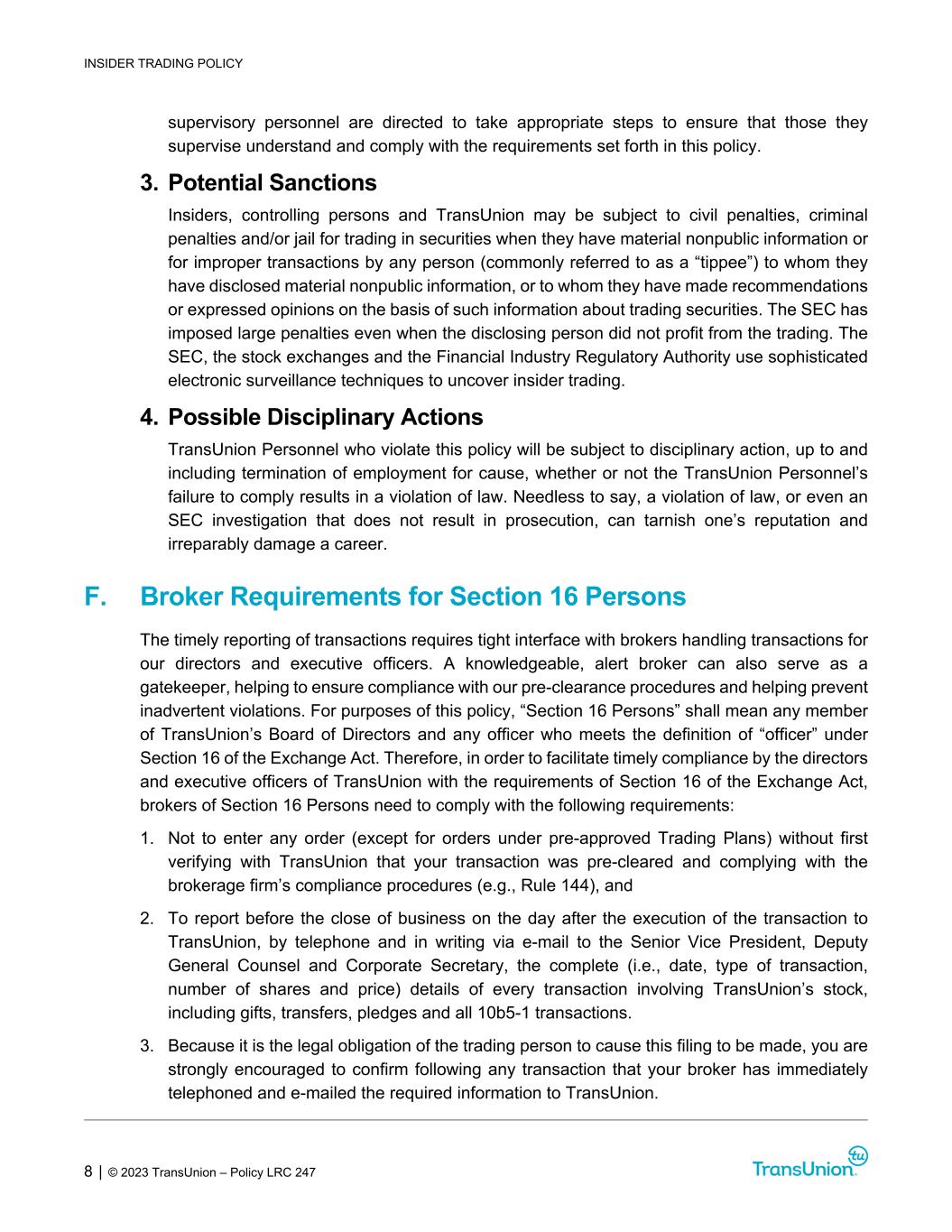
INSIDER TRADING POLICY 8 | © 2023 TransUnion – Policy LRC 247 supervisory personnel are directed to take appropriate steps to ensure that those they supervise understand and comply with the requirements set forth in this policy. 3. Potential Sanctions Insiders, controlling persons and TransUnion may be subject to civil penalties, criminal penalties and/or jail for trading in securities when they have material nonpublic information or for improper transactions by any person (commonly referred to as a “tippee”) to whom they have disclosed material nonpublic information, or to whom they have made recommendations or expressed opinions on the basis of such information about trading securities. The SEC has imposed large penalties even when the disclosing person did not profit from the trading. The SEC, the stock exchanges and the Financial Industry Regulatory Authority use sophisticated electronic surveillance techniques to uncover insider trading. 4. Possible Disciplinary Actions TransUnion Personnel who violate this policy will be subject to disciplinary action, up to and including termination of employment for cause, whether or not the TransUnion Personnel’s failure to comply results in a violation of law. Needless to say, a violation of law, or even an SEC investigation that does not result in prosecution, can tarnish one’s reputation and irreparably damage a career. F. Broker Requirements for Section 16 Persons The timely reporting of transactions requires tight interface with brokers handling transactions for our directors and executive officers. A knowledgeable, alert broker can also serve as a gatekeeper, helping to ensure compliance with our pre-clearance procedures and helping prevent inadvertent violations. For purposes of this policy, “Section 16 Persons” shall mean any member of TransUnion’s Board of Directors and any officer who meets the definition of “officer” under Section 16 of the Exchange Act. Therefore, in order to facilitate timely compliance by the directors and executive officers of TransUnion with the requirements of Section 16 of the Exchange Act, brokers of Section 16 Persons need to comply with the following requirements: 1. Not to enter any order (except for orders under pre-approved Trading Plans) without first verifying with TransUnion that your transaction was pre-cleared and complying with the brokerage firm’s compliance procedures (e.g., Rule 144), and 2. To report before the close of business on the day after the execution of the transaction to TransUnion, by telephone and in writing via e-mail to the Senior Vice President, Deputy General Counsel and Corporate Secretary, the complete (i.e., date, type of transaction, number of shares and price) details of every transaction involving TransUnion’s stock, including gifts, transfers, pledges and all 10b5-1 transactions. 3. Because it is the legal obligation of the trading person to cause this filing to be made, you are strongly encouraged to confirm following any transaction that your broker has immediately telephoned and e-mailed the required information to TransUnion.

INSIDER TRADING POLICY 9 | © 2023 TransUnion – Policy LRC 247 G. Rule 10b5-1 Trading Plans The trading restrictions set forth in this policy, other than those transactions described in Sections B.4 and B.5, do not apply to transactions under a previously established contract, plan or instruction to trade in TransUnion’s securities entered into in accordance with Rule 10b5-1 (a “Trading Plan”) that: has been submitted to and preapproved by the Chief Legal Officer (or their designee); includes a “Cooling Off Period” for o Section 16 Persons that extends to the later of 90 days after adoption or modification of a Trading Plan or two business days after filing the Form 10-K or Form 10-Q covering the fiscal quarter in which the Trading Plan was adopted, up to a maximum of 120 days; and o employees and any other persons, other than TransUnion, that extends 30 days after adoption or modification of a Trading Plan; for Section 16 Persons, includes a representation in the Trading Plan that the Section 16 Person is (1) not aware of any material nonpublic information about TransUnion or its securities; and (2) adopting the Trading Plan in good faith and not as part of a plan or scheme to evade Rule 10b-5; has been entered into in good faith at a time when the individual was not in possession of material nonpublic information about TransUnion and not otherwise in a blackout period, and the person who entered into the Trading Plan has acted in good faith with respect to the Trading Plan; either (1) specifies the amounts, prices, and dates of all transactions under the Trading Plan; or (2) provides a written formula, algorithm, or computer program for determining the amount, price, and date of the transactions, and (3) prohibits the individual from exercising any subsequent influence over the transactions; and complies with all other applicable requirements of Rule 10b5-1. The Chief Legal Officer (or their designee) may impose such other conditions on the implementation and operation of the Trading Plan as the Chief Legal Officer (or their designee) deems necessary or advisable. Individuals may not adopt more than one Trading Plan at a time except under the limited circumstances permitted by Rule 10b5-1 and subject to preapproval by the Chief Legal Officer (or their designee). Directors, Section 16 Persons and other persons, as designated by the Chief Financial Officer and Chief Legal Officer, shall be subject to the terms and conditions set forth in the TransUnion Director and Executive Stock Sale Policy. An individual may only modify a Trading Plan outside of a blackout period and, in any event, when the individual does not possess material nonpublic information. Modifications to and terminations of a Trading Plan are subject to preapproval by the Chief Legal Officer (or their designee) and modifications of a Trading Plan that change the amount, price, or timing of the purchase or sale of the securities underlying a Trading Plan will trigger a new Cooling-Off Period.

INSIDER TRADING POLICY 10 | © 2023 TransUnion – Policy LRC 247 TransUnion reserves the right to publicly disclose, announce, or respond to inquiries from the media regarding the adoption, modification, or termination of a Trading Plan and non-Rule 10b5-1 trading arrangements, or the execution of transactions made under a Trading Plan. TransUnion also reserves the right from time to time to suspend, discontinue, or otherwise prohibit transactions under a Trading Plan if the Chief Financial Officer or the Chief Legal Officer, or the Board of Directors, in its discretion, determines that such suspension, discontinuation, or other prohibition is in the best interests of TransUnion. Compliance of a Trading Plan with the terms of Rule 10b5-1 and the execution of transactions pursuant to the Trading Plan are the sole responsibility of the person initiating the Trading Plan, and none of TransUnion, the Chief Financial Officer or the Chief Legal Officer, or TransUnion’s other employees assumes any liability for any delay in reviewing and/or refusing to approve a Trading Plan submitted for approval, nor the legality or consequences relating to a person entering into, informing TransUnion of, or trading under, a Trading Plan. H. Company Assistance and Education 1. Education TransUnion shall take reasonable steps designed to ensure that all directors and employees of TransUnion are educated about, and periodically reminded of, the federal securities law restrictions and TransUnion policies regarding insider trading. 2. Assistance TransUnion shall provide reasonable assistance to all directors and executive officers, as requested by such Directors and executive officers, in connection with the filing of Forms 3, 4 and 5 under Section 16 of the Exchange Act, to the extent such filings are necessary. However, the ultimate responsibility, and liability, for timely filing remains with the directors and executive officers. Questions regarding this policy should be directed to the Senior Vice President, Deputy General Counsel and Corporate Secretary, or other attorney with responsibility for securities matters. I. Maintenance of Records TransUnion shall maintain such records as deemed necessary or desirable by the Chief Legal Officer regarding: 1. dispositions of requests to engage in transactions pursuant to Section B, Restrictions on Pledges, and Restriction on Short Sales and Derivative Transactions, and Section C, Notice and Pre-Clearance of Transactions; Pre-Transaction Clearance; 2. dispositions of requests to review 10b5-1 trading plans pursuant to Section F; and 3. notices to directors, executive officers, and other employees pursuant to Section B and Section C.
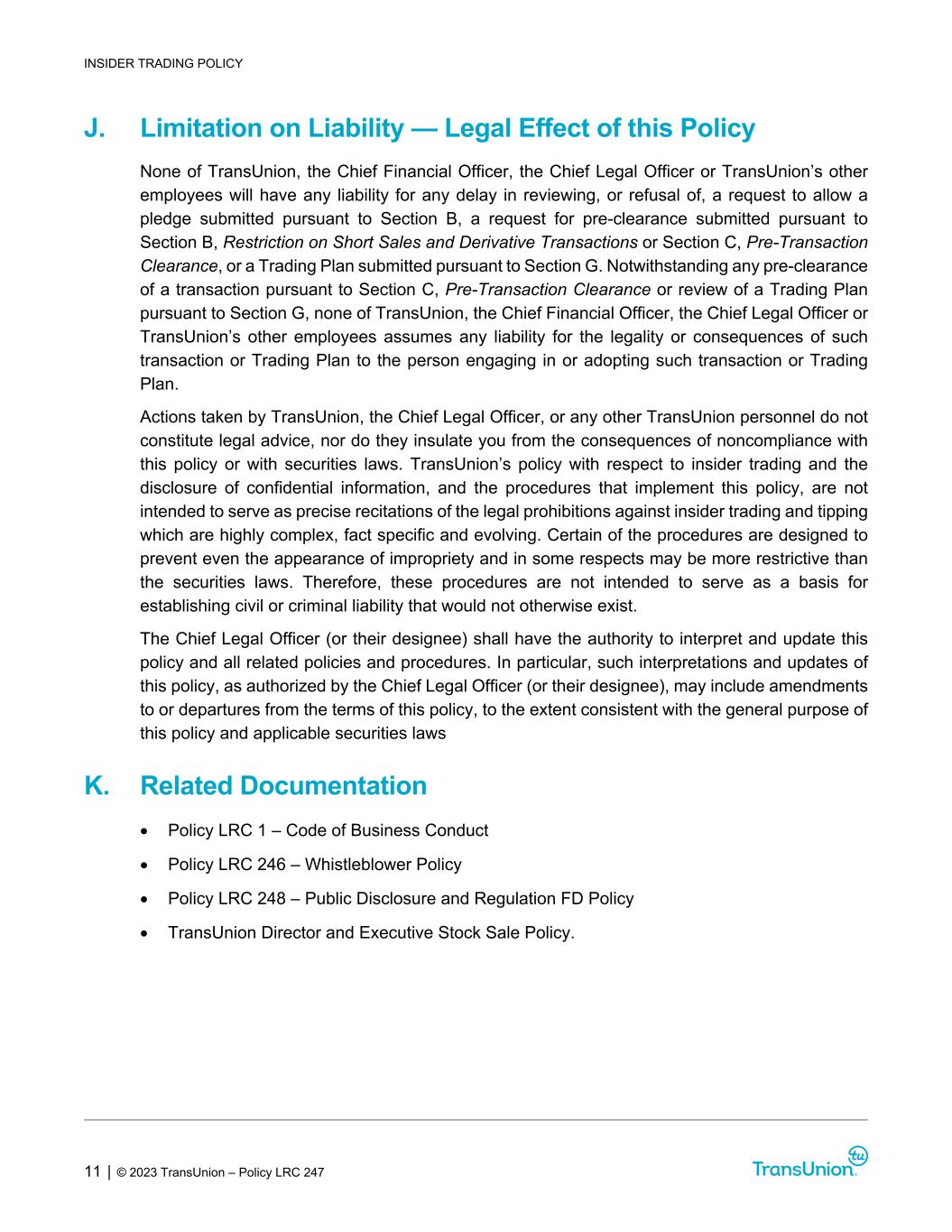
INSIDER TRADING POLICY 11 | © 2023 TransUnion – Policy LRC 247 J. Limitation on Liability — Legal Effect of this Policy None of TransUnion, the Chief Financial Officer, the Chief Legal Officer or TransUnion’s other employees will have any liability for any delay in reviewing, or refusal of, a request to allow a pledge submitted pursuant to Section B, a request for pre-clearance submitted pursuant to Section B, Restriction on Short Sales and Derivative Transactions or Section C, Pre-Transaction Clearance, or a Trading Plan submitted pursuant to Section G. Notwithstanding any pre-clearance of a transaction pursuant to Section C, Pre-Transaction Clearance or review of a Trading Plan pursuant to Section G, none of TransUnion, the Chief Financial Officer, the Chief Legal Officer or TransUnion’s other employees assumes any liability for the legality or consequences of such transaction or Trading Plan to the person engaging in or adopting such transaction or Trading Plan. Actions taken by TransUnion, the Chief Legal Officer, or any other TransUnion personnel do not constitute legal advice, nor do they insulate you from the consequences of noncompliance with this policy or with securities laws. TransUnion’s policy with respect to insider trading and the disclosure of confidential information, and the procedures that implement this policy, are not intended to serve as precise recitations of the legal prohibitions against insider trading and tipping which are highly complex, fact specific and evolving. Certain of the procedures are designed to prevent even the appearance of impropriety and in some respects may be more restrictive than the securities laws. Therefore, these procedures are not intended to serve as a basis for establishing civil or criminal liability that would not otherwise exist. The Chief Legal Officer (or their designee) shall have the authority to interpret and update this policy and all related policies and procedures. In particular, such interpretations and updates of this policy, as authorized by the Chief Legal Officer (or their designee), may include amendments to or departures from the terms of this policy, to the extent consistent with the general purpose of this policy and applicable securities laws K. Related Documentation Policy LRC 1 – Code of Business Conduct Policy LRC 246 – Whistleblower Policy Policy LRC 248 – Public Disclosure and Regulation FD Policy TransUnion Director and Executive Stock Sale Policy.










